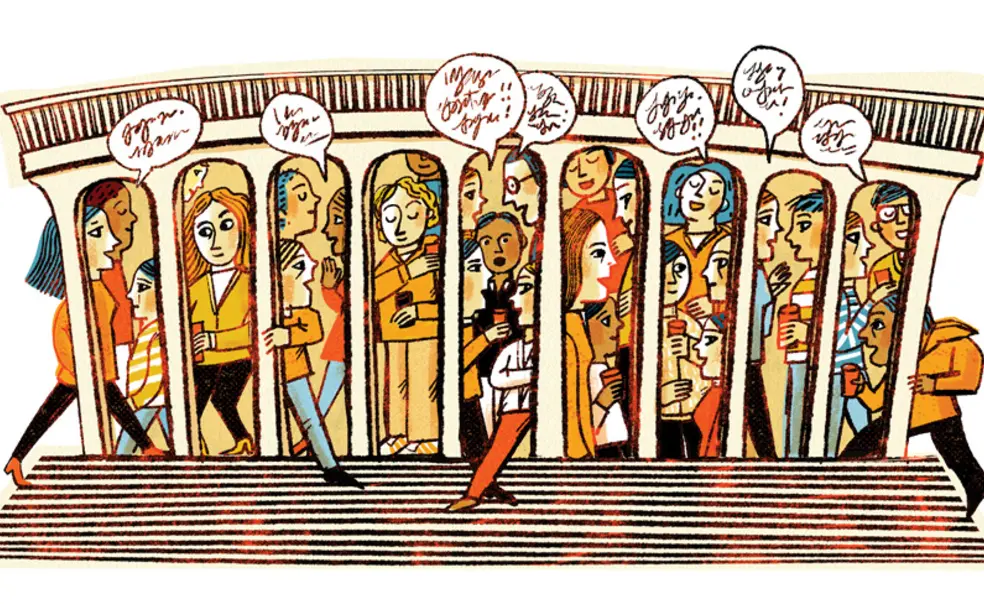From Robertson to the DBar, SPIA Grad Students Play Unique Role
When I received my acceptance to Princeton’s master in public affairs (MPA) program, I gleefully texted my best friend’s little sister, who attended Princeton for undergrad, with questions about housing and campus life. She responded back congratulating me on my acceptance but sharing that she didn’t know anything about the Graduate School, adding that “Princeton is an undergraduate-focused institution … .” The ellipsis told me everything I needed to know about the vibes on campus and how graduate students were perceived.
Numbers tell part of the story: Princeton boasts no schools of medicine, business, or law, so there are significantly more undergraduates (5,726) than grad students (3,324). In comparison, Harvard has approximately 7,100 undergraduate students and 17,000 graduate students (including the Harvard Extension School).
About 88% of graduate students at Princeton are enrolled in Ph.D. programs and focused on lab and field research, writing their dissertations, and serving as assistant instructors for undergraduate courses. The School of Public and International Affairs (SPIA) stands out as the only professional school at Princeton and plays a unique role in the graduate population due to the tight-knit, sometimes even “culty,” nature of our cohort.
Bonding is woven into the fabric of the SPIA master’s program and is arguably the most important part of the experience. A hallmark of the program is what we call “math camp.” We arrive on campus at the end of July and spend four weeks bonding through classes, social events, and our own orientation. By the time the fall semester begins, we know everyone in our approximately 100-person cohort. We all take the same core curriculum, the vast majority of us live in the Graduate College during our first year, and you can almost always find hordes of SPIA students hanging out at Shultz Cafe between classes at Robertson Hall.
In the program, many of us have between two and 10 years of work experience, so we know exactly how lucky we are to have a two-year reprieve from the workforce and often act accordingly. There is no shortage of social events and intramural sports teams in SPIA, which has earned us a bit of a reputation among the graduate population. The non-SPIA grad students were all too eager to share their perceptions when I was conducting research for this article. When it comes to general morale among SPIA master’s students, Maxime Keutgen de Greef, a geosciences Ph.D. student, remarked, “You guys don’t study, you don’t work, and you’re happier than everyone else.” Kelly Finke, who’s pursuing a Ph.D. in ecology and evolutionary biology, sighed and said, “You can always tell who the MPAs are because they still have life in their eyes.”
On the party front, Sam Kosai, a sociology Ph.D. student, said, “I know them as the people who throw parties in Lakeside, and I’m envious of them because they actually have the capacity to party.” Finke added that “you always know when SPIA rolls up to DBar” (Debasement Bar in the Graduate College) due to the sheer numbers and the volume with which we enter.
All MPAs at SPIA receive a full-tuition scholarship and a living stipend, promoting a sense of duty among alumni to give back that’s apparent when cold emailing SPIA alumni. At Reunions, SPIA alumni are significantly overrepresented relative to their numbers on campus. According to Michele Whitlow, associate director of alumni affairs at SPIA, at Reunions in 2024, SPIA alumni made up 38% of graduate attendees, despite making up only 15% of the graduate alumni population.
The SPIA graduate experience isn’t just about shotskis at DBar, intramural sports championships, and spending most of our waking hours in the basement of Robertson Hall. It’s about living and learning alongside some of the smartest, most interesting, service-oriented people I’ve ever known. The people we meet and the bonds we build turn into our lifelong network that persists far beyond these two years. SPIA provides us with the policy toolkit necessary to pursue impactful careers in the nation’s service and in the service of humanity, and we have a lot of fun while doing it.










No responses yet